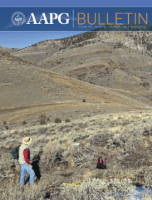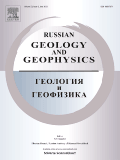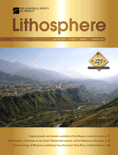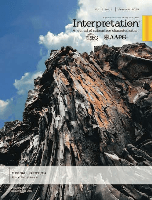
AAPG BULLETIN
Scope & Guideline
Shaping the dialogue in geology and energy engineering.
Introduction
Aims and Scopes
- Petroleum Geology and Exploration:
Focused on the study of petroleum systems, including source rock evaluation, migration pathways, and accumulation mechanisms. The journal covers both conventional and unconventional reservoirs, facilitating a deeper understanding of hydrocarbon exploration. - Geochemical and Petrophysical Characterization:
Emphasizes the integration of geochemical analyses with petrophysical properties to evaluate reservoir quality and performance. This includes studies on organic geochemistry, fluid migration, and reservoir simulations. - Sedimentology and Stratigraphy:
Explores sedimentary processes and stratigraphic frameworks that influence reservoir development. This includes the analysis of depositional environments, sequence stratigraphy, and the impact of geological history on current petroleum systems. - Geomechanics and Reservoir Behavior:
Investigates the mechanical properties of geological formations and their influence on fluid flow and reservoir performance. This includes studies on stress states, fracture networks, and diagenetic processes. - Innovative Exploration Technologies:
Utilizes advanced technologies such as machine learning, seismic inversion, and high-resolution imaging to enhance exploration and reservoir characterization. The integration of data analytics is a growing focus to improve decision-making in resource assessment.
Trending and Emerging
- Unconventional Resource Development:
There is a significant increase in research focusing on unconventional resources such as shale gas and tight oil. This includes advanced techniques for characterization, production optimization, and the study of geomechanical properties. - Sustainability and Carbon Storage Solutions:
Emerging themes around carbon capture and storage (CCS) are gaining momentum, with a focus on geological assessments for effective carbon sequestration and the potential for utilizing depleted reservoirs for storage. - Machine Learning and Data Analytics:
The integration of machine learning and artificial intelligence in geological studies is rapidly increasing. Research is focusing on predictive modeling, automated data interpretation, and enhanced reservoir characterization, showcasing the potential of big data in geology. - Geomechanical and Fluid Dynamics Studies:
There is a growing emphasis on understanding the geomechanical behavior of rocks in relation to fluid dynamics, particularly in the context of hydraulic fracturing and reservoir management. - Paleoenvironments and Their Impact on Hydrocarbon Accumulation:
Research exploring the influence of paleoenvironmental factors on current hydrocarbon systems is trending, highlighting the importance of historical geological contexts in resource evaluation.
Declining or Waning
- Traditional Geophysical Methods:
There appears to be a waning interest in conventional geophysical methods, such as basic seismic reflection techniques, as newer methods incorporating machine learning and advanced imaging technologies gain traction. - Basic Hydrocarbon Reservoir Studies:
Research focusing solely on conventional hydrocarbon reservoirs without an integrated approach is becoming less prominent. The trend is moving towards interdisciplinary studies that consider geochemistry, geomechanics, and advanced modeling. - Historical Petroleum Systems Analysis:
While historical analyses of petroleum systems have been essential, there is a noticeable decline in papers dedicated exclusively to this area. Current research emphasizes predictive modeling and real-time data integration over retrospective studies. - Geological Mapping without Advanced Techniques:
There is less emphasis on traditional geological mapping methods that do not incorporate modern technologies like digital mapping, 3D modeling, or GIS applications, as the field moves towards more sophisticated approaches.
Similar Journals

Russian Geology and Geophysics
Unveiling Earth's Secrets, One Study at a TimeRussian Geology and Geophysics is a seminal journal published by GEOSCIENCEWORLD that plays a pivotal role in the dissemination of vital research within the realms of Earth-Surface Processes, Geology, and Geophysics. With an ISSN of 1068-7971 and an E-ISSN of 1878-030X, this journal has witnessed a continuous evolution since its convergence in 2007 and is poised to thrive through 2024. While it is not an Open Access journal, it is recognized for its significant contributions to the academic community, holding a respectable Q2 ranking in Earth-Surface Processes and Q3 rankings in both Geology and Geophysics as of 2023. The journal’s impact factors align it within competitive quartiles, marking it as an essential resource for researchers and professionals seeking to stay at the forefront of geological and geophysical sciences. By publishing high-quality peer-reviewed articles, the journal fosters an environment of knowledge sharing and innovation, making it indispensable for students, practitioners, and scholars alike who are dedicated to advancing our understanding of Earth's complex systems.

LITHOLOGY AND MINERAL RESOURCES
Bridging Knowledge Gaps in Mineral ExplorationLITHOLOGY AND MINERAL RESOURCES, published by PLEIADES PUBLISHING INC, is a specialized journal dedicated to advancing knowledge in the fields of economic geology, geochemistry, and petrology. With its ISSN 0024-4902 and E-ISSN 1608-3229, this journal has established itself as a critical resource for scholars and practitioners alike, examining the intricate relationships between lithology and mineral deposits, and their implications for resource management. As indicated by its positioning in the Q3 quartile for both economic geology and geochemistry and petrology in 2023, the journal is recognized for its valuable contributions to the scientific community, ranking #28 out of 43 in Economic Geology and #112 out of 154 in Geochemistry and Petrology according to Scopus. The journal's publication history reveals a rich tradition of excellence, as it has been continuously contributing to the field from 1984 to 2024. While it does not offer open access options, researchers and practitioners can easily engage with its robust body of work in effective ways to support their own studies and applications. The importance of LITHOLOGY AND MINERAL RESOURCES lies in its commitment to publishing high-quality research that informs practices in mineral exploration and environmental stewardship, making it an essential resource for anyone invested in the future of earth sciences.

Moscow University Geology Bulletin
Elevating Geological Research to New HeightsMoscow University Geology Bulletin, published by SPRINGER INT PUBL AG, is a prominent platform for disseminating critical research in the field of Earth and Planetary Sciences. With an ISSN of 0145-8752 and an E-ISSN of 1934-8436, this journal is well-regarded for its contributions to diverse geological studies and interdisciplinary advancements that shape our understanding of the planet. The journal has established itself in the academic community, particularly noted for its ranking in the Q3 category within Earth and Planetary Sciences as of 2023. Despite its limited open-access options, the Moscow University Geology Bulletin remains an essential resource for researchers, professionals, and students through its well-curated articles and synthesis of geoscientific knowledge. With annual volumes converging from various years, including significant years like 2012 to 2024, it aims to uphold its mission of fostering scholarly dialogue and innovation in the geosciences.

Lithosphere
Empowering Scholars to Shape the Future of Geoscience.Lithosphere, published by GEOSCIENCEWORLD, is a premier open access journal that has been at the forefront of geological research since its inception. With the ISSN 1941-8264 and the E-ISSN 1947-4253, this journal serves as a vital resource for researchers, professionals, and students interested in Earth and planetary sciences, particularly in the field of geology. Its impressive ranking of Q2 in the 2023 category indicates its vital role in disseminating high-quality, impactful research. The journal’s commitment to open access since 2018 enhances its reach, providing global accessibility to cutting-edge studies that span a diverse range of geoscientific topics, from tectonics to sedimentology. With Scopus Rank #88 out of 321 in Earth and Planetary Sciences, it offers a strong platform for scholars to share their findings and engage with the latest advancements in the discipline. As the journal continues its convergence from 2009 to 2024, Lithosphere remains a crucial publication for those striving to deepen their understanding of Earth's systems.

Applied Geophysics
Bridging Theory and Application in GeophysicsApplied Geophysics is a premier journal dedicated to the interdisciplinary study of geophysical processes and their applications across various domains, published by SPRINGER. With an ISSN of 1672-7975 and an E-ISSN of 1993-0658, this journal serves as a pivotal platform for researchers, professionals, and students to share their latest findings and insights in the field of geophysics. Operating from China, the journal has established itself within the Q3 quartile in Geophysics as of 2023, reflecting its commitment to high-quality research, even as it ranks #105 out of 165 in the Earth and Planetary Sciences category, placing it in the 36th percentile on Scopus rankings. This makes it an essential resource for advancing knowledge in geophysical methodologies and applications. While it operates in a traditional subscription model, its relevance and timeliness ensure it remains a crucial outlet for emerging scientific discussions. The journal particularly encourages the integration of practical applications with theoretical frameworks, fostering innovation in areas such as environmental geophysics, resource exploration, and hazard assessment.

Geofizicheskiy Zhurnal-Geophysical Journal
Advancing Geophysical Insights for a Dynamic WorldGeofizicheskiy Zhurnal-Geophysical Journal, published by the esteemed S I Subbotin Institute of Geophysics, National Academy of Sciences of Ukraine, stands as a vital resource for professionals and researchers in the field of geophysics. With an ISSN of 0203-3100 and an E-ISSN of 2524-1052, this journal is recognized for its rigorous peer-reviewed articles that delve into various aspects of geophysical research, including seismic studies, geodynamics, and Earth surface processes. Although currently not under an open access model, the journal maintains a commitment to disseminating high-quality research, thereby enriching the global geophysical community. The publication aims to foster collaboration and knowledge transfer among scientists and engineers while addressing complex geophysical challenges in a rapidly evolving landscape. By engaging with cutting-edge research, readers can expect to uncover insights that advance both theoretical understanding and practical applications in geophysical science.

Interpretation-A Journal of Subsurface Characterization
Exploring Innovative Solutions for Subsurface CharacterizationInterpretation: A Journal of Subsurface Characterization is a premier academic journal dedicated to advancing the methodologies and technologies integral to the characterization of subsurface environments. Published by the Société de l'Exploration Geophysicists (SEG), this journal serves the fields of geology and geophysics, reflecting its critical role in the intersection of these domains. With an h-index that underscores its scholarly impact and its ranking in the Q2 category for both Geology and Geophysics, Interpretation is recognized for publishing high-quality, innovative research that offers valuable insights and solutions to contemporary challenges in subsurface exploration. Since its inception in 2013, the journal has quickly become essential reading for researchers, professionals, and students alike, providing open access to a wealth of knowledge fostering collaboration and advancement within the geoscience community. Featuring a comprehensive range of studies, methodologies, and reviews, Interpretation is integral for professionals striving to enhance their understanding of subsurface dynamics and impacting areas such as resource management, environmental conservation, and hazard assessment.

NORWEGIAN JOURNAL OF GEOLOGY
Shaping the Future of Geology Through Collaboration.NORWEGIAN JOURNAL OF GEOLOGY, published by the Geological Society of Norway, stands as a vital resource in the fields of geology, geochemistry, petrology, geophysics, oceanography, and paleontology. Since its transition to an Open Access model in 2015, this journal has significantly expanded its reach, allowing for greater dissemination of cutting-edge research and insights. With an ISSN of 2387-5844 and E-ISSN of 2387-5852, the journal is committed to fostering collaboration and knowledge exchange among the scientific community. The journal's categorization in the Q3 quartile across various Earth and Planetary Sciences fields underscores its status as a reputable publication, offering researchers, professionals, and students alike a platform to share their findings and advancements in geology. Continuing through its converged years from 2015 to 2024, the NORWEGIAN JOURNAL OF GEOLOGY plays a crucial role in enhancing our understanding of Earth's processes and materials, making it an important reference for anyone engaged in geoscientific research.

MARINE GEOPHYSICAL RESEARCH
Advancing the frontiers of marine geophysics.MARINE GEOPHYSICAL RESEARCH is a prominent journal published by Springer, dedicated to advancing the field of marine geophysics, with significant contributions to geochemistry, petrology, and oceanography. Established in 1970 and currently running its volumes until 2024, this journal operates as a key resource for researchers and professionals focused on understanding the complexities of marine environments and geological processes. With a strong foothold in academic rankings—positioned in Q2 for both Geophysics and Oceanography, and Q3 for Geochemistry and Petrology in the 2023 category quartiles—MARINE GEOPHYSICAL RESEARCH provides a rigorous platform for high-quality research dissemination. Although not an open-access journal, it offers invaluable insights into marine geophysical phenomena, thus appealing to a diverse audience of scholars and practitioners. The journal’s relevance and impact are further underscored by its Scopus ranks, situating it competitively within the Earth and Planetary Sciences domain. Researchers and students seeking to stay abreast of cutting-edge developments and methodologies in marine geophysics will find it an essential addition to their academic resources.

Petrophysics
Connecting Research and Practice in PetrophysicsPetrophysics, an esteemed journal published by the Société des Pétrophysiciens et des Analysts de Forage (SPWLA), serves as a vital platform for sharing groundbreaking research in the interconnected fields of energy, geotechnical engineering, and engineering geology. With its ISSN 1529-9074, this journal has progressively established itself within the academic community, evidenced by its ranking in the Q3 category for both Energy (miscellaneous) and Geotechnical Engineering and Engineering Geology as of 2023. Researchers and professionals can contribute to and benefit from the collective insights shared within its pages, fostering advancements in petrophysics that are crucial for addressing contemporary energy challenges. While it does not currently offer open access, the journal remains pivotal in disseminating valuable findings from 2000 to 2012 and more recently from 2017 to 2023, driving innovation within a global context from its base in Houston, Texas. Engage with Petrophysics to explore and contribute to the ever-evolving landscape of energy and geotechnical research.